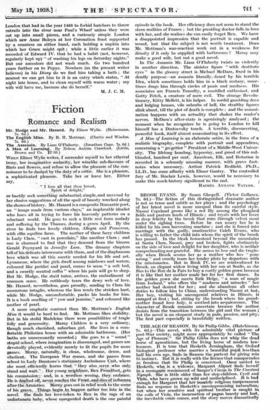THE AGE OF REASON. By Sir Philip Gibbs. (Hutchinson. 7s.
6d.)—This novel, with its admirably vital picture of post-War society, might more appropriately be called " The Age of Pleasure." Sir Philip Gibbs does not whip the dead horse of agnosticism, but the living horse of modern law- lessness. It is true that Hesketh Jerningham, the Oxford biological professor who marries a beautiful pupil. less than half-his own age, finds in Reason the pretext for giving rein fo instinct. But itis really with the -licence that masquemdee as freedom that Sir Philip is concerned. Once united to Heskethi who, is a: widower, Margaret Allptirt -finds herself in a menagerie reminiscent of Sanger's_Cirens in The Constant Nymph. She is little older than her step-children, Cyril and Viola, who have grown up wild and undisciplined. -It is
enough for Margaret that her innately religious temperament finds no response in Hesketh's uncompromising naturalism; but when her sensitive and spiritual brother is caught in the coils of Viola, the incarnation of pagan beauty and lust, the inevitable crisis comes, and the story moves dramatically to the final tragedy. The plot is exciting, and the closing scenes are as natural as they are unexpected. Well secreted, too, until the end is the key to the author's implicit moral. Margaret has been seeking religion here, there, and everywhere. But, all the ivhile,' other people, including the apparently irreclaimable Cyril, have been finding it in her. It is not so much to science or to organized Christianity that the world can look for salvation, Sir Philip seems to suggest, but to the spontaneous, unselfconscious type of purity represented by Margaret. It is only through the individual that society can be redeemed and it is to =the old ideals of simplicity and love that we must return if civilization is to endure. This is Sir Philip Gibbs at his best.:























































 Previous page
Previous page